| Heath Town Baths has been in the news following its
recent closure. The local authority has decided not to refurbish and
reopen the baths because it would cost around one million pounds to
do so. The building may be converted into a health clinic, which
would save it from the threat of demolition and also secure the
future of the on-site library. Whatever happens it looks as though
the days of swimming at Heath Town Baths have ended. |
 |
In its heyday the baths was well known because of
the successful swimming club that was based there and has now almost
been forgotten.
Bill Edwards, who was 80 in 2003, is best known today for his car
racing activities with his son Peter. Bill was once well known as a
successful swimmer and one of the founders of the Heath Town
Swimming Club. In the remainder of this article he remembers
some of the swimming teams and the events in which they
participated. He has also kindly allowed us to use some of the
excellent photographs of the teams from his collection. |
| The Swimming Club
Just after the war we demobbed and formed the Heath Town
Swimming Club. Arthur Robbins who used to be a councillor was
one of the founders. I was captain of the water polo team.
A lot of the men have now passed away. They made Heath Town
famous and went to the national championships.
|

Bill Edwards |
|
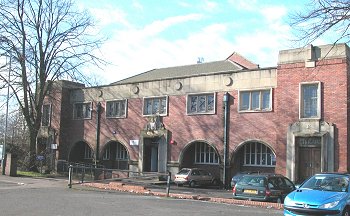
Heath Town Baths
|
|
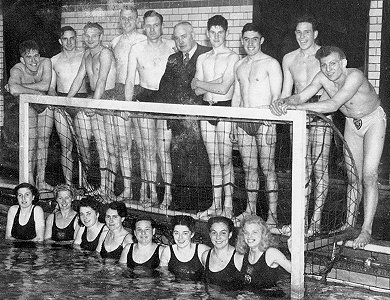
The 1948 International Team |
The International
Team
In 1948 a team from the swimming club took part in an
international competition at Tilberg in Holland. Bill Edwards on
the far right, won a gold medallion in the 200m breast stroke.
Several other team members gained second and third places in
their events.
|
The team members are as follows:
Men - left to right:
Mr. McConkey, a free styler and lifesaver, Norman Wilkes an
all-round swimmer, Tommy Hulme, free style and goalkeeper, Jack
Patton, Arthur Wilkes, Mr. Wainwright who organised the events, Ken
Roper, Peter Holmes a local councillor, an unknown team member, and
on the extreme right is Bill Edwards
Women:
1st left is Freda Holt who won a silver medal, 4th from the left
is Gladys Morcom, 5th from the left is Thelma, 3rd from the right
is Hazel Peace, backstroke champion, on the far right is Jill
Cooke.
Hazel Peace and Bill Edwards trained with Johnny Weissmuller
for a week at the Derby baths in Blackpool. Johnny became famous
as the silver screen's first Tarzan. He was the first person to
swim 100m in less than one minute. His 59 second record was made
at the 1924 olympics in Paris. At the games he won 3 gold medals
for swimming and a bronze medal for water-polo. |
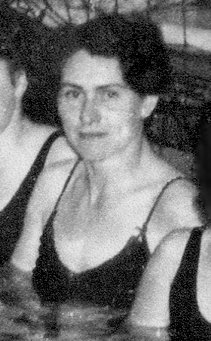 |
A close-up of Gladys Morcom,
who was a member of the 1936
British Olympic team, and took part in the games at Berlin. She was
chief coach at Heath Town Baths and taught many people. Her married
name was Lees. Sadly she passed away on 19th January, 2010
at the age of 91.
I must thank Gordon Brown, ex-Heath Town swimmer, water polo
player, and coach, for the information. |
| The Water Polo Team
The first and second teams photographed on 8th
October 1953.
Front row:
2nd from the left is Ivor Bickley, next is Jimmy Sidebotham who
was a famous water polo player and to the right is Philip Cooke
the referee. He became one of the leading olympic referees in
the country and has since died. On the far right is Bill
Edwards. |
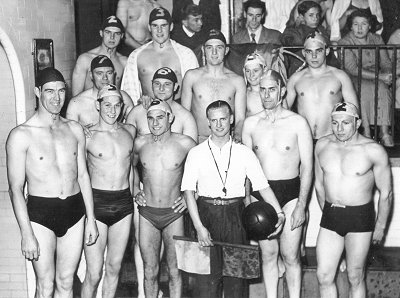 |
2nd row - left to right:
Arthur Robbins (club secretary), Tommy Hulme.Back
row - left to right:
? , Ken Roper, Brian Moore, ? , Alf Bowen.
|
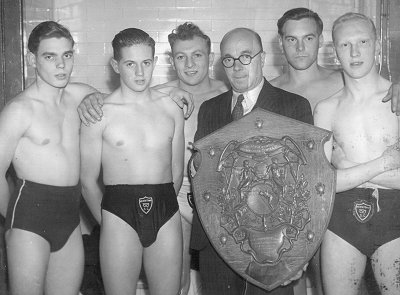 |
The Canning Shield
team
The team won the prestigious shield after winning a series of
events across the country.
left to right:
Alf Bowen, free style; Alan Treen, back stroke; Bill Edwards,
breast stroke; J.V. Watkiss, the club president with the shield;
Joe Smith; Jeff Evans, free style. |
| Famous Heath Town
champions of the 1950s
back row - left to right:
Phil Cooke, a diving champion and referee who used to go around
the local clubs doing charity work. He used to do high dives and
death dives from out of the roof into the shallow end. He was
Jill Cooke's brother. Next is Tommy Hulme a diver, then Bill
Edwards, a diver and breast stroke champion. |
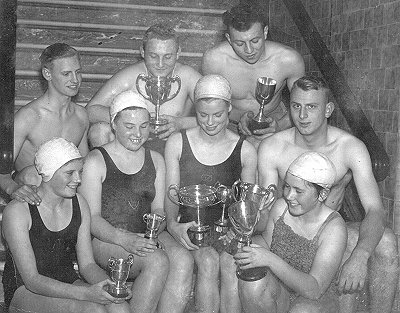 |
front row - left to right:
Myra Jervis, Thelma, Jill Cooke a free style champion who
emigrated to Canada and has since died, Jack Patton a backstroke
champion, with Moira Jervis in front. |
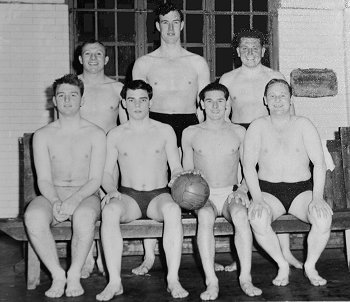 |
An Early Polo Team
back row - left to right:
Bill Edwards, unknown tall goalkeeper who could stand in the 6ft
end with the water only coming up to the bottom of his chin. On
the right is Freddie Heath.
front row - left to right:
Brian Moore, Alfie Bowen, Tommy Sidebotham,
Tommy Hulme, . |
| Bill Edwards in
Action
Bill is seen here diving from the high diving board at the
Kingfisher club. Bill was 200m breast stroke champion because of
his ability to swim under water. He still holds the record for
under water swimming at Heath Town Baths, where he swam four
lengths under water. He was a frogman in the war and learned how
to breathe under water. This can be a big advantage in a race
because you can swim faster under water.
Bill has suffered for his success in the sport. He had a
terrible accident in one of his polo matches, when he lost an
eye in a clash with Michael Hands. |
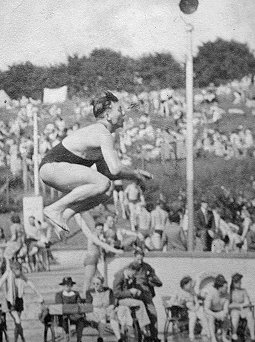 |
|
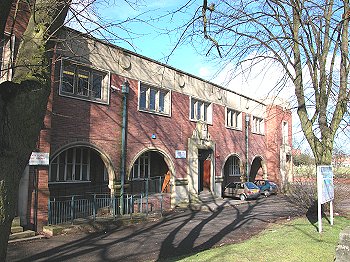
Another view of the baths |
|
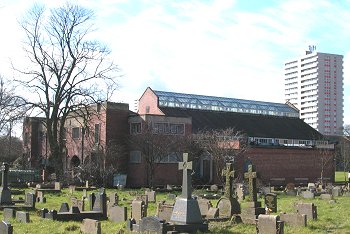
The view of the baths from the
cemetery |
|
We would like to thank Bill Edwards for his help in
producing this article.
David Patten has kindly sent us some interesting
photographs from his family archives and we have included them
here. They were taken in the 1940s and feature some of Heath
Town Bath's swimming teams. He tells us that his grandfather,
Harry Patten, was club president and ran a concentrated coaching
campaign at the baths from 1962.
|
 |
David's father, John, is standing third from the
left at the back and his grandfather, Harry is sitting on the
extreme left. |
| John is standing in the centre at the back. |
 |
| If anyone has any further information on the
swimming club or can recognise any of the unknowns in the team
photographs please contact the webmaster. |

|
|
 |
| Return to
the previous page |
|
Read Duncan
Nimmo's article on the baths |
|